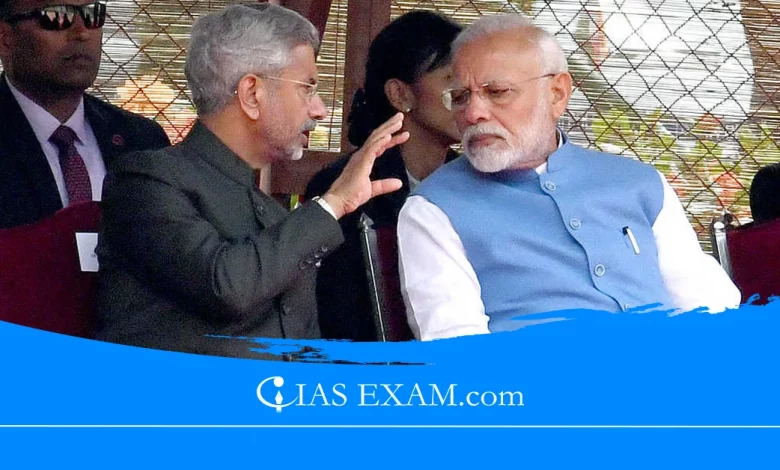Revisiting India’s Neighborhood First Policy
GS Paper 2 - India and its Neighborhood, International Treaties & Agreements

Context
With recent shifts in global and internal political and economic landscapes among neighbouring countries, India has a renewed opportunity to invigorate its Neighbourhood First Policy (NFP), which it should seize wholeheartedly. If India aims to counter China’s maneuverability in the region, the warmth and closeness observed in its relations with Bhutan should be extended to the entire immediate and extended neighborhood.
This editorial analysis delves into the significance of reimagining and reinvigorating India’s NFP in the current geopolitical landscape.
About India’s NFP Policy
- The Neighbourhood First Policy was first conceived in 2008. India’s strategy of ‘Neighbourhood First’ aims to foster amicable and mutually advantageous relationships with all of its neighbors.
- India participates in several initiatives in these nations as an active development partner.
- India’s strategy for interacting with its neighbors is based on non-reciprocity, consultation, and a goal of obtaining concrete results.
- This strategy places a high priority on improving infrastructure, connection, development cooperation, security, and encouraging more interpersonal interactions.
Significance of NFP
- Countering Chinese Influence: Collaboration with neighbouring countries serves India’s strategic interests in countering Chinese influence in the Indian Ocean Region (IOR).
- Support in Multilateral Fora: Cooperation with neighbouring partners is essential for India’s leadership role as a representative of the Global South in various multilateral forums such as the UNSC, WTO, and IMF.
- Ensuring Territorial Integrity: Neighbouring countries’ cooperation is crucial for India’s efforts to maintain its territorial integrity and combat separatist threats.
- Enhancing Maritime Security: Effective cooperation with neighbouring countries like Maldives, Sri Lanka, Bangladesh, and Myanmar is essential for bolstering maritime security.
- Addressing Energy Security: Cooperation with northern neighbors like Nepal and Bhutan, as well as countries in the Indian Ocean, is critical for ensuring India’s energy security.
- Leveraging Soft Power Diplomacy: India’s rich cultural and historical ties with its neighbors serve as a cornerstone of its soft power diplomacy. By promoting cultural exchanges and emphasizing shared heritage, India strengthens people-to-people ties and enhances its influence in the region.
Issues with India’s NFP
While India’s Neighborhood First Policy (NFP) aims to foster strong and mutually beneficial relationships with its neighboring countries, it faces several challenges and issues that hinder its effective implementation.
- Historical Baggage: India’s historical disputes and unresolved conflicts with certain neighboring countries, such as Pakistan and China, pose significant challenges to the NFP. These longstanding tensions create mistrust and inhibit cooperation, undermining efforts to strengthen bilateral ties.
- Power Dynamics: India’s size and influence in the region can sometimes lead to perceptions of hegemony among its smaller neighbors. This power asymmetry complicates efforts to build trust and equal partnerships, as neighboring countries may feel marginalized or coerced by India’s dominance.
- Regional Instability: The volatile security environment in South Asia, characterized by ongoing conflicts, terrorism, and territorial disputes, presents a major obstacle to the NFP. Regional instability undermines efforts to promote peace and security, making it difficult to establish durable relationships with neighboring countries.
- External Influence: The increasing presence and influence of external powers, particularly China, in India’s neighborhood pose a challenge to the NFP. Chinese investments, infrastructure projects, and diplomatic overtures in South Asia have raised concerns about India’s strategic position and influence in the region.
- Economic Disparities: Wide disparities in economic development and infrastructure among neighboring countries hinder efforts to promote regional integration and cooperation. Economic disparities can exacerbate tensions and competition, particularly in areas such as trade, investment, and connectivity.
- Domestic Politics: Domestic political factors in neighboring countries, such as leadership changes, internal conflicts, and nationalist sentiments, can impact bilateral relations with India. Political instability and governance challenges in neighboring countries complicate efforts to maintain stable and constructive partnerships.
Conclusion
The revitalization of India’s Neighborhood First Policy is imperative in the current geopolitical context. By reimagining and reinvigorating its approach towards neighboring countries, India can consolidate its position as a regional leader and counterbalance China’s influence in the region. A proactive and inclusive NFP that prioritizes bilateral cooperation, addresses regional challenges, promotes economic integration, and fosters people-to-people exchanges will contribute to peace, stability, and prosperity in the South Asian region. As India seizes the opportunity to strengthen its ties with its neighbors, it reaffirms its commitment to the principles of peaceful coexistence, mutual respect, and shared prosperity.
SOURCE: The Hindu





.png)



